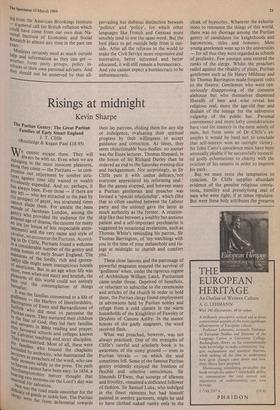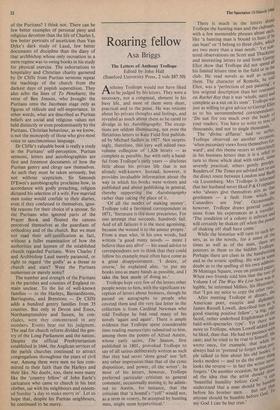Risings at midnight
Kevin Sharpe
The Puritan Gentry: The Great Puritan Families of Early Stuart England J. T. Cliffe
(Routledge & Kegan Paul £18.95) We cannot escape them. They will always be with us. Even when we are indulging in the most innocent pleasures, along they come — the Puritans — to com- promise our enjoyment by sombre stric- tures against time idly wasted or wealth kfrIvolouslY expended. And so, perhaps, it "as always been. Even those — if there are any left — who are attracted to the past by the prospect of gayer, less straitened times Cannot elude them. For amidst the beau monde of Jacobean London, among the gentry who provided the audience for the greatest age of drama, the custom for many n. inn (or house of less respectable enter- inment) and the very name and style of
avalier we encounter the Puritans. Accord- !rig to Dr Cliffe, Puritans found a welcome In a considerable number of the gentry and noble homes of early Stuart England. The
aasions of the lordly, rich and (poten- tially) idle might seem inauspicious hostels of asceticism. But in an age when life was short, even when not nasty and brutish, the Pleasures of this world could not entirely blot out the contemplation of things hereafter. It was the families committed to a life of !a.odliness — the Harleys of Herefordshire, arringtons of Essex and Barnardistons of Suffolk who did most to patronise the nntan cause. They nurtured their children In the fear of God; they led their families and servants in Bible reading and prayer; Thefavoured schools and colleges known -T.Ir Calvinist teaching and strict discipline. the intermarried. Most of all, these were 1,"e families who housed the chaplains le°unded
by authority, who maintained the
their preachers of the word, who sawas sermons safely to the press. The path k, heaven cannot have been easy. In 1634, a h'e°rt.hamptonshire mercer thought that _s arIng two sermons on the Lord's day was essential for salvation. del' °I. was the road made smoother for the clelcacY °f gentle or noble feet. The Puritan clergy were far from deferential towards
their lay patrons, chiding them for any slip or indulgence, evaluating their spiritual progress by their willingness to accept guidance and correction. At times, they seem objectionable busy-bodies: no sooner was the Essex lecturer, Thomas Shepard, in the house of Sir Richard Durley than he ordered an end to the Saturday evening dice and backgammon. Not surprisingly, as Dr Cliffe puts it with undue delicacy,`not everyone appreciated his reforming zeal.' But the games stopped, and between many a Puritan gentleman and preacher was formed a 'special relationship', which (like that so often vaunted between the Labour party and the unions) gave the latter as much authority as the former. A relation- ship like that between a wealthy but anxious patient and a self-important psychiatrist is suggested by occasional revelations, such as Thomas White's reminding his patron, Sir Thomas Barrington, of 'my watchings with you in the time of your melancholy and ris- ings at midnight to cherish and comfort you.'
These close liaisons and the patronage of powerful magnates ensured the survival of `godliness' when, under the rigorous regime of Archbishop William Laud, Puritanism came under threat. Deprived of benefices, or reluctant to subscribe to the ceremonies and articles of the church in order to hold them, the Puritan clergy found employment in advowsons held by Puritan nobles and refuge from a cold climate in the warm households of the Knightleys of Fawsley or Drydens of Canons Ashby. In the manor houses of the godly magnates, the word received flesh.
What was preached, however, was not always practised. One of the strengths of Cliffe's careful and scholarly book is its awareness of the stony ground — even in Puritan terrain — on which the seed sometimes fell. Some of the famous Puritan gentry evidently enjoyed the freedom of flexible and selective consciences. Sir Simonds D'Ewes, that scourge of idleness and frivolity, remained a dedicated follower of fashion. Sir Samuel Luke, who indulged in the finest raiments but had himself painted in sombre garments, might be said to have clothed naked vanity only in the
cloak of hypocrisy. Whatever the exhorta- tions to renounce the things of this world, there was no shortage among the Puritan gentry of candidates for knighthoods and baronetcies, titles and honours. Most young gentlemen went up to the universities — for all that they were regarded as schools of profanity. Few younger sons entered the ranks of the clergy. Whilst the preachers railed against the ribaldry of plays, Puritan gentlemen such as Sir Henry Mildmay and Sir Thomas Barrington made frequent visits to the theatre. Gentlemen who were cen- soriously disapproving of the common alehouse but who themselves dispensed liberally of beer and wine reveal less religious zeal, more the age-old fear and disdain of the lounge for the subversive vulgarity of the public bar. Personal convenience and more lofty considerations have vied for mastery in the most saintly of men, but from some of Dr Cliffe's ex- amples it would be hard not to conclude that self-interest won an outright victory. Sir John Cutts's conscience must have been unusually pliable if he successfully reconcil- ed godly exhortations to charity with the eviction of his tenants in order to improve his park.
But we must resist the temptation to cynicism. Dr Cliffe supplies abundant evidence of the genuine religious convic- tions, humility and .proselytising zeal of men who were right, if at times repulsive. But were these holy attributes the preserve of the Puritans? I think not. There can be few better examples of personal piety and religious devotion than the life of Charles I, few better portraits of asceticism than Van Dyke's dark study of Laud, few better documents of discipline than the diary of that archbishop whose only recreation in a stern regime was to swing books in his study for physical exercise. The exhortations to hospitality and Christian charity garnered by Dr Cliffe from Puritan sermons repeat the teachings of the church from the darkest days of popish superstition. They also echo the lines of To Penshurst, the verse of Ben Jonson, who brought the Puritans onto the Jacobean stage only as figures of ridicule and self-importance. In other words, what are described as Puritan beliefs are social and religious values not held distinctly or even predominantly by the Puritans. Christian behaviour, as we know, is not the monopoly of those who give most voice to sanctimonious language.
Dr Cliffe's valuable book is really a study in the Puritans' self-perception. Puritan sermons, letters and autobiographies are first and foremost documents of how the Puritan gentry and clergy saw themselves. As such they must be taken seriously, but not without scepticism. Sir Simonds D'Ewes's autobiography proclaims how, in accordance with godly preaching, religion dictated his selection of a wife. Few married men today would confide to their diaries, even if they confessed to themselves, igno- ble reasons for their choice of a spouse. So the Puritans who ignored parts of the Prayer Book and flouted the canons perceived themselves as the guardians of orthodoxy and of the church. But we must not read their self-justification as fact, without a fuller examination of how the authorities and laymen of the established church regarded Puritans. Were Charles I and Archbishop Laud merely paranoid, or right to regard 'the godly' as a threat to church and state? Were the Puritans numerous or merely noisy?
The number and strength of the Puritans in the parishes and counties of England re- main unclear. To the list of well-known families — to the Harleys, Barnardistons, Barringtons, and Breretons — Dr Cliffe adds a hundred gentry families from 35 counties. But only in Devon and Essex, Northamptonshire and Sussex, he con- cludes, were they concentrated in any numbers. Events bear out his judgment. The zeal for church reform divided the gen- try of the Long Parliament and the nation. Despite the official Presbyterianism established in 1644, the Anglican services of the parish churches continued to attract congregations throughout the years of civil war. Among them were men no less com- mitted to their faith than the Harleys and their like. No doubt, too, there were many like the 'country fellow' of John Earle's caricature who came to church in his best clothes, sat with his neighbours and esteem- ed Sunday 'a day to make merry in'. Let us hope that, despite his Puritan neighbours, he continued to be merry.







































 Previous page
Previous page